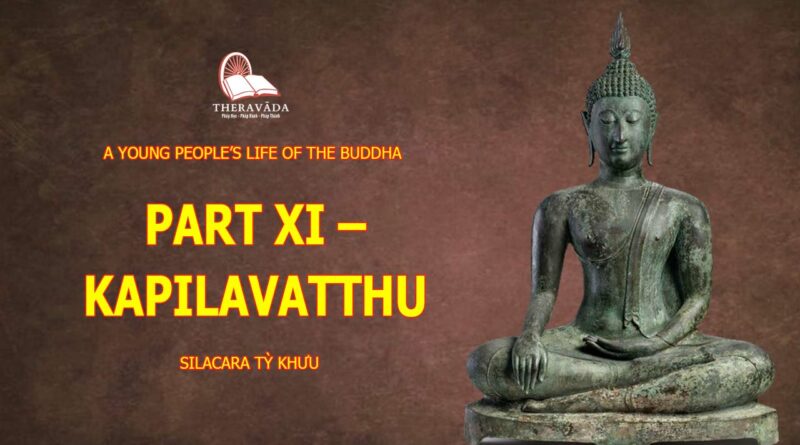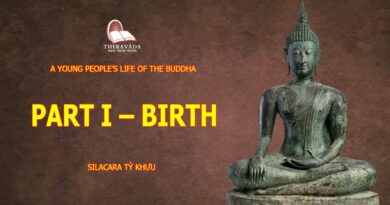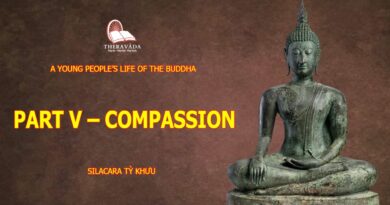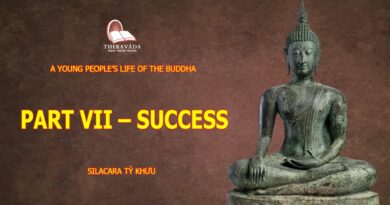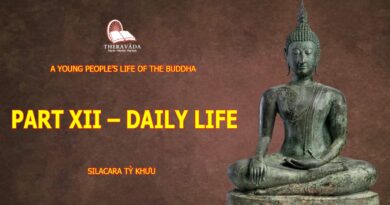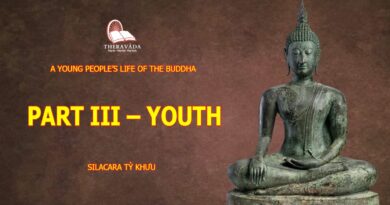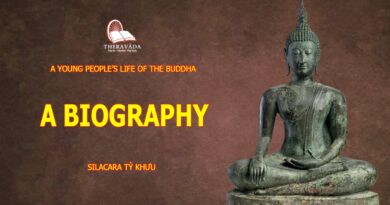A YOUNG PEOPLE’S LIFE OF THE BUDDHA: PART XI – KAPILAVATTHU
When the Buddha’s father, King Suddhodana, heard that his son was now at Rajagaha, he sent a messenger to tell Him that His father was now getting old, and begged that He would come and let him see his son once more before he died. But the messenger he sent happened to arrive at Rajagaha just when the Buddha was preaching to the people. So he sat down and listened to the preaching till it was finished before trying to deliver his message. But what the Buddha said seemed to him so good and so true as he listened to it, that when the discourse was ended, in his pleasure and delight with it, he had forgotten all about what he had come for, he had forgotten the message King Suddhodana had sent him to take to his son the Buddha, and instead of delivering it, he remained with the Buddha so as to hear Him preach some more.
King Suddhodana at Kapilavatthu, meanwhile waited a long time for his messenger to come back and tell him what his son had said in reply to his message, but no messenger came. Then he sent another messenger to take the same message to his son the Buddha, and to see what had happened to his first messenger. But this second messenger also, when he arrived, found the Buddha preaching, listened to His preaching, became converted to His doctrine, and remained with Him. Then King Suddhodana sent out a third messenger with his message and to see what had happened to the first two he had sent; but the same thing happened to him as to the other two before him; he did not come back with any answer. And so, one after another, King Suddhodana sent out other messengers until he had sent out nine altogether; but none of them came back. They were also charmed by the Buddha’s words that they forgot what they had been sent to say, and stayed with the Buddha so as to hear more of His preaching.
The King thought it was very strange that none of his messengers had come back with any answer. He asked Yasodhara, his son’s wife, to try do what she could to get an answer from Him, and to bring Him to Kapilavatthu. So now Yasodhara sent a messenger asking her husband to come and see her and Rahula, who was a fine little boy seven years old. But the same thing happened to her messenger as happened to King Suddhodana’s: he was so pleased with the Buddha’s preaching that he forgot the message he had been sent with, and did not return. Then another and another messenger was sent by Yasodhara but none of them returned. All were captivated by the Buddha’s words, and remained with Him.
And now Yasodhara did not know what more she could do to get her husband to come and see her and His son. Then King Suddhodana remembered that there was a young man about the court called Udayi who had formerly been the Buddha’s favorite playmate when they both were boys together. And he thought that if he sent Udayi to tell his son that His old father wanted to see Him once more before he died, perhaps He would listen to this old friend of His boyhood’s days, and come to Kapilavatthu. For of course, neither the King nor Yasodhara knew that all the messengers they had sent before had never delivered their message at all.
So now the friend of His youth, Udayi, was sent to ask the Buddha to come to Kapilavatthu and let everyone there see His face once more — His father, His wife, His son, and all the people of the country who would have called Him their king one day if He had not gone away to become a religious teacher. And when Udayi came to Rajagaha he soon learned the real reason why King Suddhodana’s and Princess Yasodhara’s messengers had never come back. So Udayi stopped his ears while the preaching was going on for fear that he too might do as the others had done. But when the preaching was over, he went to the Buddha and after greeting Him with profound reverence, he told Him that His father and wife and son, as well as all the people of Kapilavatthu, were very, very anxious to see the Buddha that had appeared in the world, and asked Him out of compassion to come and visit them soon. Then the Buddha very kindly said that He would not refuse to gratify the wish of those who were His own people, and that very soon He would go to Kapilavatthu and see them all. So Udayi hurried back to King Suddhodana bearing the news that He who before was Prince Siddhattha, and now was the great, the universally honored Buddha, soon would be coming to the city to do the duty of a son to his father.
Then every one in Kapilavatthu, from the King downward, was filled with joy to know that their prince who had left them seven long years ago and become a homeless beggar in order to follow the religious life, had succeeded in His efforts to find the Truth, and was now a Buddha, a teacher not only of men but of the very gods, and soon would be back among His own folk again to tell them what he had found.
So they swept up all the streets of the city and made them clean as they never had been made clean before. They decorated all their houses with flowers, and hung flags and streamers of many colored cloth along the streets, and prepared to give their prince a reception worthy of the eldest son of their Raja, and a great Buddha as well.
And on the day when the Buddha was expected to arrive in the city, the king sent out his best elephants decorated with all their royal ornaments, along the road by which he thought his son would come, in order that they might meet Him and conduct Him in regal state into the city of His fathers. Yasodhara also, on this great day, ordered her bearers to carry her litter out to the borders of the city so that she might meet her husband at the city gate. But as they were carrying her along the main street, she saw ahead of her an ascetic dressed all in yellow who was going round from door to door with a bowl in his hand begging alms of fool. “Who can that ascetic be?” she thought to herself. “Never before have I seen a begging ascetic look so noble an dignified as this one does. He must be a very good and holy man.” But as she came nearer, what was her surprise to find that the yellow-robed beggar was her own husband, the father of her child, the handsome Prince Siddhattha of former days! He was not handsome now in the way that he used to be handsome. About Him now there was something that was better than handsomeness, something great and high and holy that made her get down out of her litter and bow low before His feet, as He passed upon His silent way, His eyes fixed on the ground, not seeing her.
But when she returned to the Palace and told the king her father-in-law in what way his son and her husband, had come into the city, as a beggar, King Suddhodana was filled with humiliation and anger at the news. At once he ordered his charioteer to get the chariot ready and he drove furiously through the streets of the city towards the place where Yasodhara had told him she had seen her husband begging. When the king got there he found the Buddha calmly pacing along towards the Palace with a worshiping crowd all round Him. But the king’s indignation and anger at his son’s behavior in begging where He had the right to take all He wanted without asking leave, remained as great as ever, and he at once began to scold and upbraid Him.
“What is this I hear about you, my son?” he cried. “Was it for this that you left your father’s home, to come back begging your daily food like the commonest beggar in the kingdom — you, the son of the king, the heir to the throne? O my son, you have this day disgraced me and the royal house to which you belong. When did any of your race and lineage do a thing like this? When did any of our family before beg his food like a common beggar?”
But the Buddha quietly answered his grieved, indignant father: “Indeed, my father, this is how my race and lineage have always done.”
“Your race have always been kings for as long as men can remember,” said King Suddhodana proudly. “Not one of them ever did a thing like this.”
“That is true, my father,” the Buddha gently answered. “But now I do not think of my earthly descent. Now I belong to the race of the Buddha of all time. It is of them that I speak when I say that I only do as my race has always done. For the Buddhas have always done like this, and now, as is only right and proper, I do the same.”
And as the Buddha walked along beside his father towards the Palace, He told him that He was not coming back to the home of His fathers, by any means poor or empty handed. He told him that He was bringing back with Him a precious jewel, the richest, most precious jewel in the world, the jewel of the security of Nibbana. And then He went on to tell His father all about that great security, Nibbana, and about the way in which it can be reached. And when He had come to the Palace, He sat down and explained the Truth He had discovered so simply and persuasively that not only His father and Yasodhara and His son Rahula, but all the people of Kapilavatthu became his followers and accepted His Teaching as true. And after a short time, His son Rahula was ordained and became a member of the Order of Bhikkhus.

